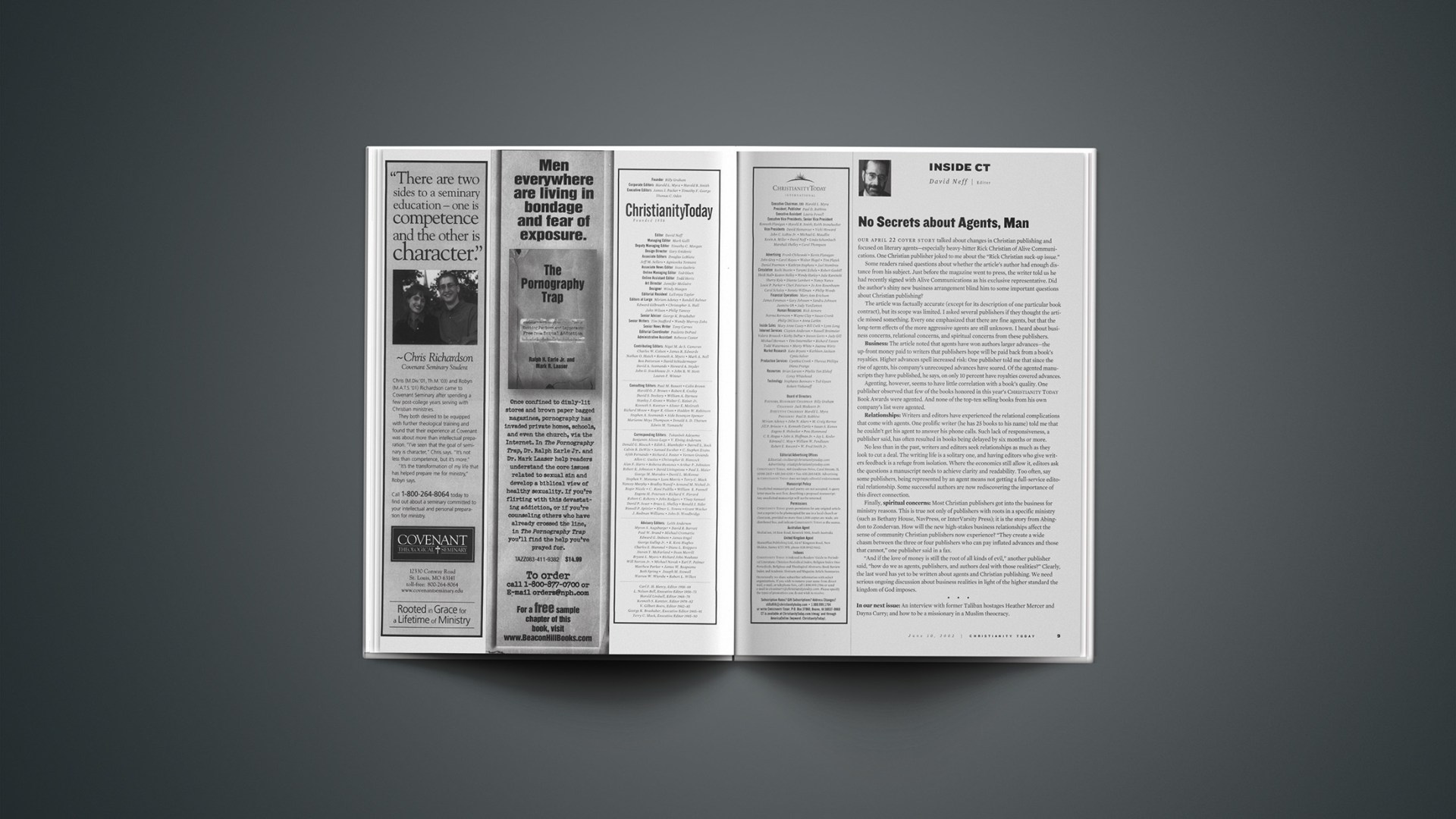Our April 22 cover story talked about changes in Christian publishing and focused on literary agents—especially heavy-hitter Rick Christian of Alive Communications. One Christian publisher joked to me about the "Rick Christian suck-up issue."
Some readers raised questions about whether the article's author had enough distance from his subject. Just before the magazine went to press, the writer told us he had recently signed with Alive Communications as his exclusive representative. Did the author's shiny new business arrangement blind him to some important questions about Christian publishing?
The article was factually accurate (except for its description of one particular book contract), but its scope was limited. I asked several publishers if they thought the article missed something. Every one emphasized that there are fine agents, but that the long-term effects of the more aggressive agents are still unknown. I heard about business concerns, relational concerns, and spiritual concerns from these publishers.
Business: The article noted that agents have won authors larger advances—the up-front money paid to writers that publishers hope will be paid back from a book's royalties. Higher advances spell increased risk: One publisher told me that since the rise of agents, his company's unrecouped advances have soared. Of the agented manuscripts they have published, he says, on only 10 percent have royalties covered advances.
Agenting, however, seems to have little correlation with a book's quality. One publisher observed that few of the books honored in this year's Christianity Today Book Awards were agented. And none of the top-ten selling books from his own company's list were agented.
Relationships: Writers and editors have experienced the relational complications that come with agents. One prolific writer (he has 25 books to his name) told me that he couldn't get his agent to answer his phone calls. Such lack of responsiveness, a publisher said, has often resulted in books being delayed by six months or more.
No less than in the past, writers and editors seek relationships as much as they look to cut a deal. The writing life is a solitary one, and having editors who give writers feedback is a refuge from isolation. Where the economics still allow it, editors ask the questions a manuscript needs to achieve clarity and readability. Too often, say some publishers, being represented by an agent means not getting a full-service editorial relationship. Some successful authors are now rediscovering the importance of this direct connection.
Finally, spiritual concerns: Most Christian publishers got into the business for ministry reasons. This is true not only of publishers with roots in a specific ministry (such as Bethany House, NavPress, or InterVarsity Press); it is the story from Abingdon to Zondervan. How will the new high-stakes business relationships affect the sense of community Christian publishers now experience? "They create a wide chasm between the three or four publishers who can pay inflated advances and those that cannot," one publisher said in a fax.
"And if the love of money is still the root of all kinds of evil," another publisher said, "how do we as agents, publishers, and authors deal with those realities?" Clearly, the last word has yet to be written about agents and Christian publishing. We need serious ongoing discussion about business realities in light of the higher standard the kingdom of God imposes.
Copyright © 2002 Christianity Today. Click for reprint information.
Related Elsewhere
Recent Christianity Today articles referenced above include:
No Longer Left BehindAn insider's look at how Christian books are agented, acquired, packaged, branded, and sold in today's marketplace.
CT Book Awards 2002Here are the books our judges—200 pastors, scholars, and church leaders—considered the worthiest this year.










